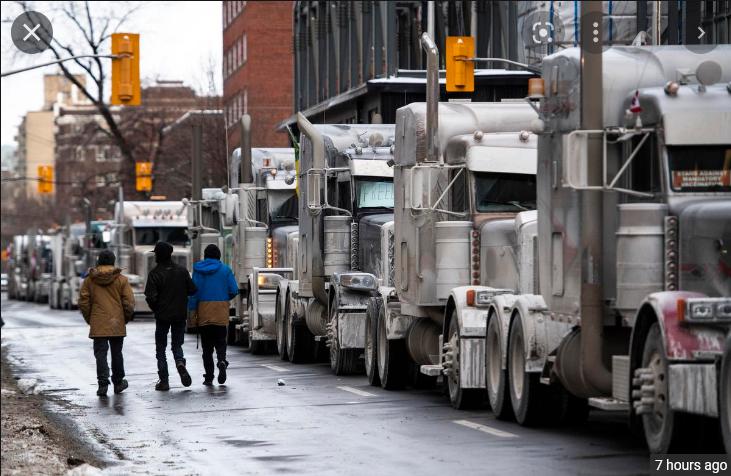Africa-Press – Gambia. From the truckers’ convoy to nineties nostalgia, we’ve selected some of the best long reads of the week on thestar.com.
Want to dive into more long features? Sign up for the Weekend Long Reads newsletter to get them delivered to your inbox every Saturday morning.
1. Mississauga councillor resigned after a fellow councillor allegedly vandalized her SUV in the city hall parking garage
When Karen Ras resigned her seat from Mississauga’s city council, she thanked her family, colleagues and voters, but said little about why she was leaving before her term was up.
A farewell letter she posted online in mid-January referenced “workplace issues” faced by Mississauga councillors that she says aren’t effectively handled by the city’s code of conduct for politicians.
What Ras did not say at the time, was that for much of this term her vehicle had been repeatedly vandalized in the city parking garage.
And, she alleges to Torstar, it was another councillor who did it — Ron Starr, who has served on council for more than a decade.
2. The inside story of the plot to topple Erin O’Toole: ‘It’s about character’
For some Conservatives, it became clear more than a year ago that Erin O’Toole wasn’t going to survive as leader of their party.
O’Toole himself didn’t realize it until hours before he was ousted.
In that chasm between O’Toole and many members of his party — and the breakdown of good will and communication that created it — lie the reasons that 73 of 119 Conservative MPs voted on Wednesday to kick him out.
Some say it was O’Toole’s flip-flops that did him in, others his attempt to move the party to the centre. Some say it was his stance on conversion therapy, others his failure to consult and communicate. Some say his leadership was a casualty of the pandemic.
3. This family spent a lifetime perfecting self-isolation. They still caught COVID-19
The Vanstone family has spent a lifetime perfecting self-isolation, but when COVID-19 infiltrated their Simcoe County home, the entire household got sick.
Since Madison Vanstone’s cystic fibrosis diagnosis 20 years ago, her family has never had a virus sweep through the entire home the way COVID-19 did. Cystic fibrosis is a chronic disease that affects the lungs and other organs. The common cold or flu could wreak havoc on her body.
“We’ve lived with this scenario and this worry forever. However, [this] one just seemed to be so contagious that despite our best efforts, it went through everybody,” said Beth Vanstone, 59, who fell ill along with her husband and two daughters.
4. Toronto scientists are trying to crack one of COVID’s biggest mysteries: Its impact on the brain
For Susie Goulding the term “brain fog” doesn’t begin to cover it.
That makes it seem like she’s missed her morning coffee.
But she compares the intense and often debilitating memory, focus and concentration issues she’s faced over the past nearly two years to living with dementia.
“It’s completely flipped my life upside down,” said the 54-year-old Oakville resident.
5. The ‘Meh’ Decade: Slouchy flannel, shows about nothing, pre-internet bliss. The ’90s we romanticize — and the one we forget
When I was growing up in the ’80s and ’90s, my hometown of Lethbridge, Alberta, was not especially notable for its cultural abundance. Yet in a single year, when I happened to be in grade 12, I saw the following at our local multiplex: “Being John Malkovich,” “Eyes Wide Shut,” “Magnolia,” “Fight Club,” “Bringing Out the Dead,” “The Matrix,” “Boys Don’t Cry,” “The Thin Red Line,” “Notting Hill,” “The Blair Witch Project,” “Election,” “Princess Mononoke,” “The Insider,” “Cider House Rules,” and “The Sixth Sense.” It did not occur to us, in 1999, that this was an unusually rich crop of movies—nor did it seem weird that you would experience cinematic landmarks by Stanley Kubrick, Terrence Malick and David Fincher down the hall from Suzy Shier, Randy River, and Orange Julius.
Cinephiles everywhere remember 1999 as a banner year at the movies. Even the teen crap of that year—“American Pie,” “Cruel Intentions,” “10 Things I Hate About You”—was somehow genre-defining teen crap. As awards season ramped up, it became clear that one film was rising above the competitive field. “American Beauty” topped many “best of” lists, nabbing Oscars for Best Director, Best Screenplay, Best Actor, and Best Picture. As “Variety” put it at the time, “no other 1999 movie has benefited from such universal raves.”
Today, as Chuck Klosterman observes in “The Nineties: A Book,” “American Beauty” is widely considered not only bad, but also odious and morally reprehensible. In 1999, Roger Ebert had praised “American Beauty” for its poignant portrayal of “a man who is unloved by his wife, not respected by his daughter, and not needed at work,” which is exactly why (qua Klosterman) we now hate the film: “It examines the interior problems of upper-middle-class white people living in the late twentieth century…it was, in all probability, the last time in history such problems would be considered worthy of contemplation.”
6. Why the ‘Freedom convoy’ protest on Parliament Hill may just be the beginning
For days, the roads surrounding Parliament Hill have been choked, and the air of the nation’s capital has been thick with the incessant honking of truck horns.
As protesters continued to rally, a question hung in the air above the din.
What happens when all the trucks leave?
Initially, this was a protest against vaccine mandates for truckers crossing the Canada-U.S. border. But, as drivers from both coasts converged on Ottawa, the scope of their complaints has broadened. Now protesters have called for the elimination of all vaccine mandates, the removal of COVID-19-prevention restrictions and, at least according to a memorandum of understanding circulated by one organizer, the dissolution of Prime Minister Justin Trudeau’s government.
None of those things are likely to happen, most agree. But if nothing else, the convoy has succeeded in organizing and mobilizing a large number of people. And that means the movement likely will not end once the trucks pull out of the nation’s capital.
7. How Canada’s ‘Freedom Convoy’ is inspiring protests in other countries
An anti-vaccine-mandate protest that began with Canadian truckers and their supporters travelling to Ottawa in a convoy may be forming the template for an international populist movement against COVID-19 restrictions.
As protesters in Ottawa were promising they wouldn’t put an end to their nearly weeklong occupation, as some have called it, of the capital until all COVID-19 restrictions are lifted, organizers in other countries were using the Canadian example to advance their own campaigns.
Dozens of Facebook and Telegram groups inspired by the Canadian truckers have sprouted up across the world, from Cyprus to Argentina to New Zealand, with members expressing solidarity and shared frustration, and in some cases, even organizing convoys to their own local capitals.
8. Rubens Mukja was gone for 42 days before his family found his body. Police returned a copy of his suicide note with a breakfast order on the back
On a Saturday night in early October, Rubens Mukja, 33, walked out of the Mississauga home he shared with his parents and never came back.
For more than a month, the software developer’s whereabouts were unknown, but his family feared the worst. He’d left a suicide note in his bedroom and, alarmingly, the gun owner appeared to have left with several of his handguns he’d removed from his safe, his family said.
Although Peel Regional Police initially launched an extensive missing persons probe that drew media coverage, the weeks dragged on with no news until, the family says, they were told that searching would cease unless new information came to light — and that Rubens didn’t want to be found.
Adding to their pain, the family say they were devastated when police returned to them a copy of Rubens’ note, with food orders scrawled on the back — handwritten notes for donuts and breakfast sandwiches — raising concerns about the officers’ credibility, said Eros Mukja, Rubens’ older brother.
9. This Toronto gym owner got $250,000 in aid and says he needs more. But are subsidies just keeping ‘zombie’ businesses alive?
Two weeks ago, Hugo Croft-Levesque was staring down imminent bankruptcy for his once-thriving Toronto kick-boxing gyms.
Even with $250,000 in government subsidies since COVID-19 restrictions began crushing his business, Croft-Levesque was more than $80,000 in debt.
For the first time since the pandemic began, he couldn’t pay rent.
On the verge of collapse, he managed to buy himself more time — his landlords agreed to wait until the next round of subsidies hit his bank account.
Just how much time he’s got, it’s not clear, with federal programs designed to give businesses a fighting chance during waves of lockdowns and restrictions set to phase out in the coming months.
10. I am Toufah: The Toronto woman who stood up to a dictator and launched a West African MeToo movement
Toufah Jallow lives in two worlds that are about to collide. In the North Toronto neighbourhood she has come to call home, she is an anonymous college student, “a simple girl,” she said, “trying to go to school and take the TTC.” But in The Gambia, the small West African nation she used to call home, “simple” is a distant memory. There she is a well-known activist and former beauty pageant winner who accused a dictator of rape. She is not simply a face of the nation’s “Me Too” movement. She bears its name, writes Star columnist Emma Teitel.
“#I am Toufah” is the hashtag that flooded Gambian social media amid Jallow’s heart-rending revelation at a televised press conference, and her subsequent testimony before the country’s Truth, Reconciliation and Reparations Commission (TRRC) in 2019. Just four years earlier, at age 18, she had entered and won the Gambian version of America’s Got Talent, a state-sponsored televised beauty pageant. That distinction gained her the attention of a country and a personal audience with its president.
Later she would find herself detailing to the TRRC her charge of what happened next: in 2015, shortly after she was named pageant victor, she told them, Yahya Jammeh, the country’s then-president of more than 20 years, proposed marriage to her and then, when spurned, brutally raped her.
11. ‘Even in your death, they squeeze you out’: How cemeteries have also become out-of-reach Toronto real estate
At a cemetery in Oshawa, on a recent afternoon, a handful of people stood vigil as a woman in her early 30s was lowered into a grave — an hour’s drive away from her funeral in Toronto.
Toronto had been the young woman’s home for years, said Zoë Dodd, one of the few mourners gathered around the burial plot. She had family and friends in the city. But with social services covering her funeral costs — an arrangement available if someone dies in the city without enough money in their estate to cover basic end-of-life rituals — her final resting place was relegated to another city. They just couldn’t find a place to bury her in Toronto.
“The city squeezes out poor and working-class people,” Dodd said, noting that many of the woman’s friends couldn’t make the burial service in time — without cars, they’d be left relying on long transit commutes. “Then, even in your death, they squeeze you out to somewhere else.”
12. A drunk driver killed her children. Now she wants Ottawa to strengthen victims’ rights
Canada’s criminal justice system does little to help victims of crime despite the existence of a national victims’ bill of rights, says Jennifer Neville-Lake, whose three children were killed by a drunk driver.
She’s now pushing for Parliament to strengthen those rights.
It’s an “incredibly traumatic experience” to be a victim in the criminal justice system, Neville-Lake said in a recent interview with the Star. “You’re just carried along, you’re just there.”
All of Neville-Lake’s children, Daniel, 9, Harrison, 5, and Milagros (Milly), 2, along with her father, 65-year-old Gary Neville, were killed by drunk driver Marco Muzzo in 2015 in Vaughan, Ont., a case that shocked the country.
13. ‘How long can we keep doing this?’ CFIB president Dan Kelly on mental health, butting heads with Doug Ford, and wooing customers back during the Omicron wave
Dan Kelly is everywhere.
Between the first day of the COVID-19 pandemic nearly two years ago and late January, the Canadian Federation of Independent Business president estimates the CFIB has fielded 3,000 media interviews. He cranks out Twitter quips, talks with business reporters on live TV and appears in national newspapers (including this one). Over the holidays, he even took calls with Deputy Prime Minister Chrystia Freeland about the plight of the CFIB’s 110,000 or so members.
“I hate business subsidies,” Kelly remarks. “Nobody will be happier than me to see all of these subsidy programs eliminated.”
And yet, for the last two years the CFIB have pleaded with Ottawa to keep billions in relief money flowing to small business owners facing flatlining revenue and hiring woes.
For More News And Analysis About Gambia Follow Africa-Press






